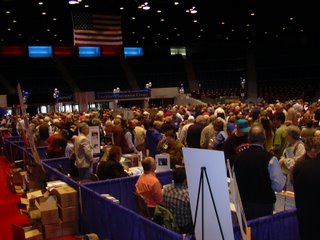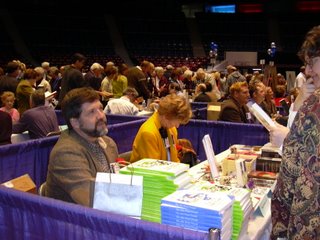Translate
Monday, December 11, 2006
Developmental English: Additional thoughts about IHIK
"I picked up your book at Border's yesterday and will read it over break. Congratulations again! The book may work as a supplementary text to my course packet. I would have 3 or 4 assignments in which the students read an article I chose. We would have class discussion and choices of 3 writing topics suggested by the chapter. In ENC 090, I tell my students to NOT do research, so the writing topics would be personal narratives or reflections. For example, if it was about Jane Todd Crawford and Ephraim McDowell, I might ask them to write about a time they remember going to a clinic or hospital for an immunization, to deliver a baby, have a broken arm set, etc.
I also would do 1 or 2 assignments in which the student would choose a chapter rather than read one I picked. "Imagine yourself as a contemporary of _____ (the most important person in the chapter). Based on the chapter and nothing else, describe what you think might be a typical day in your life. Give as many details as you can -- about dress, food, housing, leisure time, work, etc. If you met ______, what do you think you would have talked about?"
Best wishes for the holidays!"
Nancy Gall-Clayton
EES Instructor for JCPS Adult and Continuing Education
Jefferson Community & Technical College Humanities Adjunct in Developmental Writing
Louisville, KY
Sunday, November 19, 2006
25th Anniversary of the Kentucky Book Festival

 My 'table mates" were Mark Schweizer, author of liturgical mystery series: The Soprano Wore Falsettos, The Alto Wore Tweed, The Baritone wore Chiffon and The Tenor Wore Tapshoes. Sandra Tooley (aka S.D. Tooley and Lee Driver) is a mystery writer featuring her Chase Dagger series which include Nothing Else Matters, Full Moon-Bloody Moon and her newest young adult book, The Skull.
My 'table mates" were Mark Schweizer, author of liturgical mystery series: The Soprano Wore Falsettos, The Alto Wore Tweed, The Baritone wore Chiffon and The Tenor Wore Tapshoes. Sandra Tooley (aka S.D. Tooley and Lee Driver) is a mystery writer featuring her Chase Dagger series which include Nothing Else Matters, Full Moon-Bloody Moon and her newest young adult book, The Skull.With over 3,000 attendees, the aisle were packed full. The biggest draw included actress Patricia Neal (actually she wheeled down the aisle right in front of our table), Robert Hicks, Bobbie Ann Mason and even former Kentucky Governor Martha Layne Collins. All in all, the event was superb and accomodations were excellent.
Monday, October 23, 2006
See you at the Kentucky Book Fair!
Monday, October 16, 2006
IHIK integrates into the proposed 2006 Kentucky Combined Curriculum
Although the language of the Program of Studies and Core Content for Assessment version 4.1 is final, the Kentucky Department of Education's Combined Curriculum Document will remain in draft form until the following revisions have been implemented. Nonetheless, IHIK chapters fulfill this draft version for 4, 5, and high school.
SS-4-CS-S-1: 4th grade students will develop an understanding of the nature of culture:
1) explore and compare cultural elements (e.g., beliefs, traditions, languages, skills, literature, the arts) of diverse groups (e.g., Native Americans and early settlers) in the early settlement of Kentucky
2) examine the influences/contributions of diverse groups in Kentucky
SS-5-CS-S-3: 5th grade
1) Students will describe conflicts that occurred among and between diverse groups (e.g., Native Americans and the early Explorers, Native Americans and the Colonists, the British Government and the English Colonists, Native Americans and the U.S. Government) during the settlement of the United States
2) Explain the causes of these conflicts and the outcomes
SS-H-Ge-S-3: High School
Students will describe movement and settlement patterns in the modern world (1500 A.D. to present) and United States (Reconstruction to present):
1) analyze the causes of movement and settlement (e.g., famines, military conflicts, climate, economic opportunity) and their impacts in different places and at different times in history
Monday, August 14, 2006
It Happened In Kentucky Supports Kentucky Social Studies Curriculum Standards

How?
"History is the interpretation of events, people, ideas, and their interaction over time. In order for students to understand the present and make plans for their future, they must understand the past." The K-12 Teaching Learning Center presents objectives of the state's social studies standards. "Academic Expectation 2.20: Students understand, analyze, and interpret historical events, conditions, trends, and issues to develop historical perspective. The study of history at this level includes U.S. History to Reconstruction and World History to 1500. The history of the United States is a chronicle of a diverse people and the nation they formed."
Kentucky Social Studies Standards 5.1 History is Interpretive: History is an account of human activities that is interpretive in nature.
SS-M-5.1.1 Different perspectives (e.g., gender, race,region, ethnic group, nationality, age, economic status, religion, politics) result in different interpretations of historical events.
SS-M-5.1.2 Primary sources, secondary sources,artifacts, and time lines are essential tools in the study and interpretation of history.
SS-M-5.1.3 History is a series of connected events shaped by multiple cause-and-effect relationships, tying the past to the present.
Kentucky Social Studies Standards 5.2 History of the United States:
SS-M-5.2.1 America's diverse society began with the "great convergence" of European, African, and Native American people beginning in the late 15th century.
SS-M-5.2.2 The ideals of equality and personal liberty (rise of individual rights, economic freedom, colonial governments, religious diversity, Declaration of Independence, Constitution of the United States), as developed during the colonial period, were motivations for the American Revolution and proved instrumental in forging a new nation.
SS-M-5.2.3 The growth of democracy and geographic expansion were significant in American history (e.g., Louisiana Purchase, Manifest Destiny, impact on Native Americans, early industrialization, early women's rights movement).
SS-M-5.2.4 Political, social, economic, and cultural differences (e.g., slavery, tariffs, industrialism vs. agrarianism, federal vs. states' rights) among sections of the U.S. resulted in the American Civil War.
Kentucky Social Studies Standards 5.3 World History:
SS-M-5.3.5 The Age of Exploration produced extensive contact among isolated cultures and brought about massive political, economic, and social changes.
Middle School Social Studies & History Teachers
The Kentucky Department of Education notes in its core content for state social studies assessment that "middle level social studies uses the five strands of social studies (historical perspective, geography, economics, government and civics, and culture and society) in an integrated program which focuses on a different grade-level context each year."
With this in mind, I'm presenting a list of potential class assignments for social studies and history teachers based on chapters within It Happened In Kentucky.
- Newspaper article- Students assume the role of a newspaper reporter interviewing refugees from Camp Nelson (A Civil War Refugees' Expulsion from Camp Nelson- 1864); revivalists attending the Cane Ridge Revival (1801); or residents who lived through the Asiatic cholera epidemic (Asiatic Cholera find A Hero- 1833).
- Resume and cover letter- Draft a resume and subsequent cover letter for Daniel Boone (Battle of Boonesborough-1778) or Carol Sutton (Kentucky Journalist Named Woman of the Year- 1976)
- Editorial to a newspaper or magazine- Students draft an of-ed newspaper piece whether for or against state neutrality (A Governor Strives for Neutrality-1861)
- Mock trial- Students present general rules of evidence and procedure, an explanation of the basic facts, and brief statements for each witness (Delia Webster's Excursion on the Underground Railroad-1844). The 19th Judicial Circuit Court of Lake and McHenry Counties in Illinois website offers useful tips for teachers arranging mock trials classroom presentations.
- A Day In the Life Of....Students draft an essay in the first person about the epidemic or expulsion of disease, new invention, new discovery, or adventure (Frontier Abdominal Surgery-1809; The Creation of the Louisville Slugger-1884; Jenny Wiley's Indian Captivity-1789; The Opening of Louisville Municipal College-1931)
- Trip Itinerary- Students compile sites of importance, money exchange, special events and present in a PowerPoint presentation (Discovery of Mastodon Graveyard-1729; The Expedition of Dr. Thomas Walker-1750)
For more advanced students:
- Business prospectus- As an eighteenth century surveyor, students present a business prospectus to the Transylvania Land Company for settlement in the Northwest Territory (The Expedition of Dr. Thomas Walker-1750; Battle of Boonesborough-1778; The Establishment of the Pleasant Hill Shaker Colony-1808). The prospectus should include the purpose of the land company including goals, advantages to stakeholders, plan for development, long term goals, timeframe for exploration, costs, marketing to perspective settlers, risks and potential new markets, qualifications of leaders, outside legislative agencies required for permission to travel, current knowledge of the unexplored area of interest and a summary of how this new venture will influence the market.
- Emergency Crisis Management Plan- Students, taking the role of an emergency planner, submit a crisis management plan (Louisville Tornado and the Founding of the South's First Free Children's Hospital-1890; Devastating Drought-1930; Floodwaters Submerge Louisville-1937). Emergency plans would include pre and post event communications, counseling for victims, contact with appropriate agencies (environmental, labor, insurance), fire and police efforts, evacuation routes, schools, hospitals, chamber of commerce, emergency shelters, lockdown, emergency shelters, plans to reach those not easily accessible, and recording events into a permanent record.
